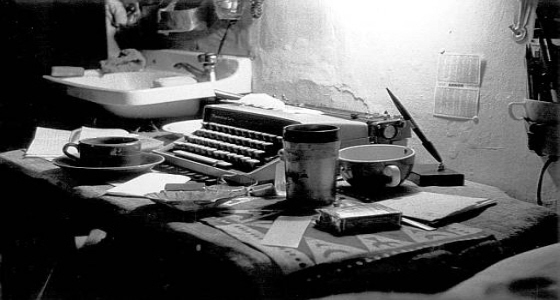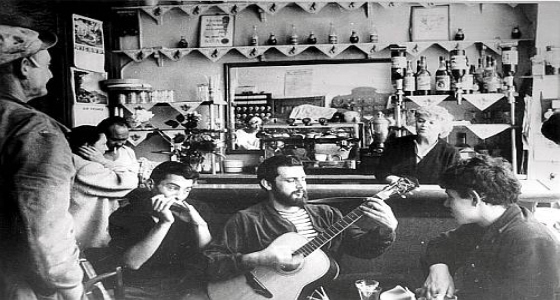
“When good Americans die, they go to Paris.”
Oscar Wilde
© Words Matteo Sedazzari
Wilde may not have been an American, but he was good (and his words and work are still a source of inspiration). Oscar Wilde died penniless at the Hôtel d'Alsace, Paris, 30th November 1900, three years after being exiled from England. Wilde was incarcerated in 1895 after being found guilty of gross indecency with other men (chiefly Lord Alfred Douglas) under the Labouchere Amendment Section 111 (basically a criminal act that made homosexuality illegal regardless whether it was consensual) and in fact was not amended until 1967. Therefore, more or less overnight, homosexuality was legalised sixty two years later.
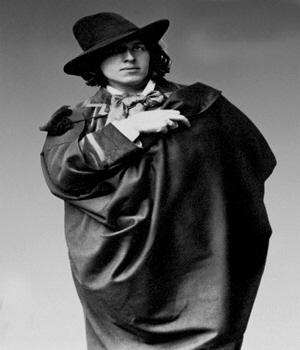 After his release Wilde was a social leper and unable to live in England, or return to the country of his birth, Ireland. He left these shores and lived firstly in Berneval-le-Grand (France) then Naples (Italy) before his final destination Paris. A man who was once the talk of the town and loved by all British society died penniless, even though his wife Constance (they never divorced) would send him funds on provision that he stayed away from Douglas, a demand which Wilde found hard to obey, yet did occasionally when he knew he needed to eat, in a city notorious for its association with art and culture, as well as fashion and political movement. Think Claude Monet, one of the founders of the French Impressionist movement, Jean-Paul Sartre playwright, novelist, screenwriter, political activist, leading light in the philosophy of existentialism and phenomenology, both born in Paris. Think also fashion house Louis Vuitton, which was founded in Paris in 1854 and the student riots of May 1968 which were spawned in Paris. If the students and workers had had a stronger alliance they could have brought the then President, Charles de Gaulle, down. However, he did resign the following year as the protests had shaken him. Oh yes, and The French Revolution 1789 to 1799, which originated in Paris, which dramatically changed French culture and history, as well as giving equal rights to their fellow man, abolishing slavery and overthrowing the monarchy , nice work. OK Napoleon Bonaparte would emerge from this but you can’t have everything.
After his release Wilde was a social leper and unable to live in England, or return to the country of his birth, Ireland. He left these shores and lived firstly in Berneval-le-Grand (France) then Naples (Italy) before his final destination Paris. A man who was once the talk of the town and loved by all British society died penniless, even though his wife Constance (they never divorced) would send him funds on provision that he stayed away from Douglas, a demand which Wilde found hard to obey, yet did occasionally when he knew he needed to eat, in a city notorious for its association with art and culture, as well as fashion and political movement. Think Claude Monet, one of the founders of the French Impressionist movement, Jean-Paul Sartre playwright, novelist, screenwriter, political activist, leading light in the philosophy of existentialism and phenomenology, both born in Paris. Think also fashion house Louis Vuitton, which was founded in Paris in 1854 and the student riots of May 1968 which were spawned in Paris. If the students and workers had had a stronger alliance they could have brought the then President, Charles de Gaulle, down. However, he did resign the following year as the protests had shaken him. Oh yes, and The French Revolution 1789 to 1799, which originated in Paris, which dramatically changed French culture and history, as well as giving equal rights to their fellow man, abolishing slavery and overthrowing the monarchy , nice work. OK Napoleon Bonaparte would emerge from this but you can’t have everything. So, in a nutshell, Paris has given the world a lot, and that’s without mentioning sport, cuisine and of course its architecture and landmarks. The Conseil d'Etat, The Panthéon, The Eiffel Tower and many more, not forgetting the wonderful Metro (Paris’s equivalent to London’s Underground).
So it is little wonder that artists like Wilde found solace in Paris, as did American writers Scott Fitzgerald, Ernest Hemingway and Gertrude Stein in the 1920s. Also the singer-songwriter, poet and maverick Jim Morrison of The Doors, who moved to Paris in March 1971 with American girlfriend Pamela Courson. Jim Morrison died of a supposedly heroin overdose in July 1971 which many still view as dubious. Nevertheless, Morrison was buried at Père Lachaise Cemetery as was Oscar Wilde, two influential icons from literature and music, resting in peace in the City of Love.
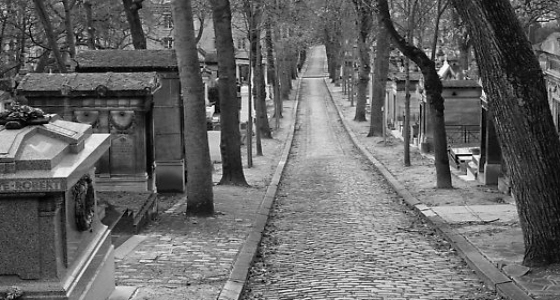
So individualistic artists, in particular ones from America, seem to have a spiritual association with Paris, and this was certainly highlighted between 1957 to 1963, when key members of The Beat Generation decided to reside there.
In summary, the Beat Generation was a collection of writers and poetics, with the occasional photographer, usually American, with a unique style that was rhythmic and hard-hitting, hedonistic in terms of drugs and sex, who rejected mainstream society and the focal point of their work was humanity which gained prominence after the publication of On The Road by Jack Kerouac, a story based on true events about two men travelling across America in a beaten up automobile, together with Allen Ginsberg’s poem : Howl , first performed in San Francisco on 7th October 1955, a mourning and cry about American society and opens with the classic line “I saw the best minds of my generation destroyed by madness, starving hysterical naked”. Seen by the mainstream as the underbelly of society, The Beat Generation had an affiliation with the criminal element, jazz musicians and blacks, and in the late fifties blacks were very outcast in American society.
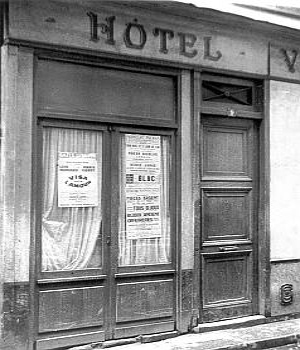 Allen Ginsberg and fellow Beat writers Peter Orlovsky and Gregory Corso decided to leave the USA, on self-imposed exile and move to Paris, where they believed they could flourish as writers. With no real in-depth knowledge or contacts in the city, and with little common knowledge of the French language, they just jumped on a plane and headed over the Atlantic for an adventure. Whether it was destiny or pure chance they found comfort and inspiration in a rundown hotel simply known as The Hotel or to use the French term L’Hotel run by Madame Rachou. L’Hotel was in the Latin Quarter or the Left Bank district of Paris.
Allen Ginsberg and fellow Beat writers Peter Orlovsky and Gregory Corso decided to leave the USA, on self-imposed exile and move to Paris, where they believed they could flourish as writers. With no real in-depth knowledge or contacts in the city, and with little common knowledge of the French language, they just jumped on a plane and headed over the Atlantic for an adventure. Whether it was destiny or pure chance they found comfort and inspiration in a rundown hotel simply known as The Hotel or to use the French term L’Hotel run by Madame Rachou. L’Hotel was in the Latin Quarter or the Left Bank district of Paris. The Left Bank is in the medieval district of Paris, which is on a par with Soho, London or Greenwich Village, New York, districts today that are seen as trendy and happening. Before these areas became the ‘place to go’, they were ‘no go places’ as they were usually quite poor and neglected with an emigrant, criminal, gay and drug users fraternity of society. The Left Bank was no different, and also had a large student community due to the University of Paris being in same area. So Hotels were accustomed to offering long term and low cost rates to guests, such as students. Ginsberg and Co. already associated with and were part of the fringes of society, not bothered about the affluent aspect of life but more of the excitement and inventiveness. They would not have been fazed by The Left Bank, in fact quite the opposite. As well as being different the area had many art galleries and second hand bookshops.
The address of L’Hotel was 9 rue Git le Coeur, a stone’s throw from the wonderful River Seine, and in 1933 Monsieur and Madame M.I. Rachou took over the management. They didn’t own the building outright nevertheless it was theirs to do what they wished. It was a simple partnership, Monsieur Rachou did the maintenance and Madame Rachou the administration, ran the bar and the small bistro. Prior to the Beat Generation’s invasion of their lodgings the Rachou’s seemed to have a strong relationship with artists and their local creative community, and even during the German occupation they were still able to operate. The Rachou’s were liberal, brave and prepared to make a stand against institutional racism, as in 1956 they gave African American crime writer Chester Himes a room with his white German girlfriend, as most of the hotels in Paris then would not give a black man bed and board especially with a white female.
It’s crazy now to think that a hotel would turn you away because of the colour of your skin. Yet kind and courageous acts like helping Himes (who had left the USA because of segregation and racism, and went to France as he was popular there) helped to change the world for the better. Moreover, Himes flourished as a crime writer and his career blossomed. It seemed living at L’Hotel was just the tonic. Another notable guest was a Swiss painter who called himself Jesus Christ. Unable to pay the rent or to buy canvasses, Madame Rachou allowed him to brighten up the place by painting on the ceilings; he moved in 1956 and moved out just before the Beat Generation invasion, as did Chimes.
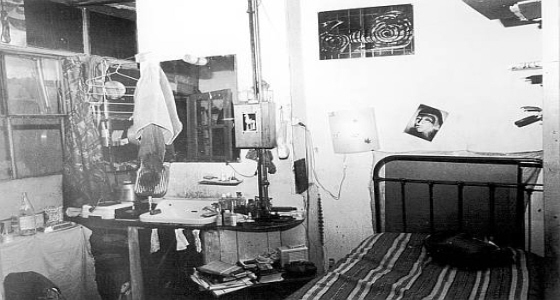
Madame Rachou was accustomed to taking paintings as payment for bed and board, and with many artists staying she soon built up a collection. Many were stored in the attic, never sold or lent to a gallery but burnt at a later date, she really was sitting on a gold mine. Regardless of who the artist was, paintings from this era especially this part of the history of art, could have been a nice earner.
Sadly tragedy hit the Rachou’s, when Monsieur Rachou was killed in a car accident in September 1957. Dealing with the untimely death of her husband, Madame Rachou threw herself into the L’Hotel and took over the maintenance duties (even though she did employ a caretaker) yet the hotel was starting to become run down.
As for the rooms themselves, forty two in total, which were small with no carpets or telephones, one 25 watt light bulb, with a radio or record player, maximum power per room was 40 watt, and could be increased to 60 Watt for a surcharge. However it wasn’t uncommon for there to be power cuts due to overloading and guests became accustomed to black outs. Many of the rooms had no windows to the outside world, and if they were lucky enough to have a window it was usually pretty small and dirty. Toilets were shared, one per floor, and they were the Turkish chiotte where you stand, toilet paper was yesterday’s newspaper, torn sheets of print nailed to the wall and the bath was on the ground floor which had to be booked in advance, as there was only hot water on Thursday, Friday and Saturday. Curtains and bedspreads were washed and changed in the spring time, and bed linen at the start of each of month, if Madame Rachou could be bothered that is. And it goes without saying pest control would have had a field day there.
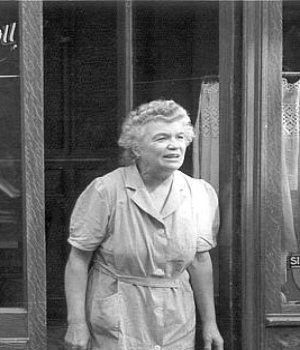 Now, as a widow, L’Hotel was her only world as it was her companion and livelihood. As mentioned Madame Rachou appreciated artists and liked their company, and when Ginsberg, Orlovsky and Corso checked in late 1957, they were welcomed with open arms, as she did with Himes and Jesus Christ. Only this time they would stay longer, invite their friends to stay, put L’Hotel on the map, and make it part of history, as it was soon to become known as The Beat Hotel.
Now, as a widow, L’Hotel was her only world as it was her companion and livelihood. As mentioned Madame Rachou appreciated artists and liked their company, and when Ginsberg, Orlovsky and Corso checked in late 1957, they were welcomed with open arms, as she did with Himes and Jesus Christ. Only this time they would stay longer, invite their friends to stay, put L’Hotel on the map, and make it part of history, as it was soon to become known as The Beat Hotel. A friendship and community would thrive for another six years. William S Burroughs who been living in Tangiers for four years whilst working on what was to become known as The Naked Lunch, soon joined his friends and found the perfect accommodation to finish his work. A British photographer, Harold Chapman, who was in France commissioned to work on a collection of French Cuisine cookery books, stumbled across The Beat Hotel whilst looking for low cost boarding. This move proved to be the making of him as he became the resident photographer of this era (his photographs today are official photos of this passing of time) as the American Beat writers welcomed him as one of their own, and this opening would evaluate him into an iconic photographer across the globe and spanning many decades. In fact Chapman and Burroughs were the last to leave the Beat Hotel when it closed in early 1963.
With many of the Beat Generation receiving unwanted attention, finding a publisher in America willing to take a risk would be hard, and Paris was home to Maurice Girodias’s Olympia Press. A publishing house which published the Traveller’s Companion series and re-printed works of literature in English that would otherwise be unobtainable to the American or British reader. Much of their income came from crime novels, and their main cash flow came from erotic novels (most famous was Vladimir Nabokov’s Lolita in 1955) and ‘dirty books’ (DB), which gave them the capital to expand in more artistic areas, and were more than happy to publish William S Burroughs’s Naked Lunch in July 1959, the story of William Lee (Burroughs’s alter ego) travelling across America whilst on the run from the police and the characters he meets along the way. The book was banned in America in 1962, due to its obscene overtones, which was overruled by the Massachusetts Supreme Judicial Court in 1966.
In addition, Burroughs continued on his creative roll. After he finished Naked Lunch, along with British born painter, writer, and poet, Brion Gysin they developed “the cut up technique” which is more or less self-explanatory. Using the Naked Lunch manuscript, they would cut each page horizontally and diagonally and reconvene the text in a new structure. Burroughs’s novel The Soft Machine (completed in 1961, during his stay at the hotel) used this method, a remix of a novel maybe. Burroughs was almost instrumental, along with Gysin and Ian Sommerville (an electronics technician and a pioneering computer programmer) in creating the first ‘dream machine’, a device that uses light and sound to create an hallucination without the aid of LSD (Acid). Ginsberg, whilst at The Beat Hotel, wasn’t idle as he became more prolific poetically and produced works such as Kaddish.
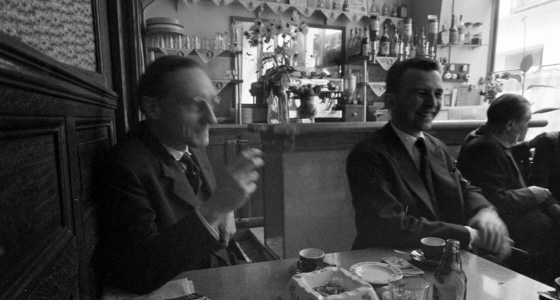
In addition, the “beat residents” produced a magazine, entitled Left Bank, only two copies of the same issue (volume 2, number 1) have ever been found. The original magazine was printed in London and distributed to tourists in the Latin Quarter in Paris around 1958 or 1959. Edited by Ronald Sheridan and other residents, with an in depth study of The Beat Hotel by Verta Kali Smart, entitled “Inside the Beat Hotel”, who opened the article with a killer and iconic line “If you’ve never heard of it, don’t be surprised because it seems no one else has either.” Other contributors were Corso, Tindall, Heliczer and, of course, Chapman providing the photographs, not much else is known about this, an early fanzine.
Overall L’Hotel was a residence to art and bohemia, who all flourished in this environment, as long as they had a bed, food, friends and a place to express themselves, without feeling threatened or inhibited they were happy. Yet it was not a total artists Utopia, as with anything in life they experienced the danger and threats of any city, and during this time the Algerian war was taking place, and some witnessed the violence that took place, and even the unrecorded murders by the French of the Algerians. Yet alliance between the artists and the more unsavoury characters of the Latin Quarter, such as pimps, thieves and dealers, the Beat Generation were allowed to go about their business fitting in, as during their stay many of them became fluent in French, which always makes life easier in a foreign country if you can speak the language.
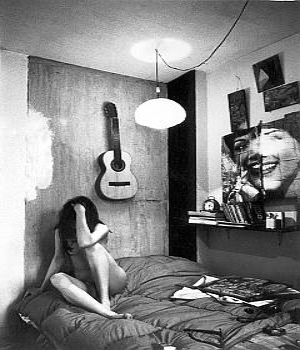 There was no dramatic ending, no police raid, fire or drug related deaths. People just moved on, as they do in life. Moreover in early 1963, Madame Rachou, with her cat, took over an hotel across the road and moved out. Burroughs witnessed the occasion ‘She looked so sad there,’ he remembered, ‘like people do when they retire. She had geraniums, an old grey chin and an old, old grey cat, and she just faded out…’. Yet Madame Rachou, a small woman in stature, but powerful and strong in spirit, had a wonderful understanding for artists and life’s outsiders. She may not have known it, or even cared about it, but she was part of French and Cultural history, a humble woman who was tough but also kind hearted, who supported key figures in the world of art, and all she wanted in return was money to cover costs and a friend, that are wonderful character traits.
There was no dramatic ending, no police raid, fire or drug related deaths. People just moved on, as they do in life. Moreover in early 1963, Madame Rachou, with her cat, took over an hotel across the road and moved out. Burroughs witnessed the occasion ‘She looked so sad there,’ he remembered, ‘like people do when they retire. She had geraniums, an old grey chin and an old, old grey cat, and she just faded out…’. Yet Madame Rachou, a small woman in stature, but powerful and strong in spirit, had a wonderful understanding for artists and life’s outsiders. She may not have known it, or even cared about it, but she was part of French and Cultural history, a humble woman who was tough but also kind hearted, who supported key figures in the world of art, and all she wanted in return was money to cover costs and a friend, that are wonderful character traits. Today, the street is still the same and in place of L’Hotel stands a modern hotel, the Relais Hotel, whose doors are open to everyone, and by the front door is a sign ‘Beat Hotel’ with a list of names, B. Gysin, H. Norse, G. Corso, A. Ginsberg, P. Orlovsky, I. Sommerville, and how W. Burroughs completed le Festin Nu (Naked Lunch) here. I have now made a mental note to make sure to visit this hotel before I die as reading, researching and writing about it has inspired me to be more creative, more adventurous and more productive. I love how organically this community grew, no master plan or agenda, just a collection of people from all different walks of life, who wanted to be creative, as well as having fun under one roof. In addition, Madame Rachou had no house rules about guests having people staying over, as long as they signed the guest book. Now you wouldn’t see a British sit com hotelier Basil Fawlty (John Cleese ) of Fawlty Towers allowing that.
There is a great book on The Hotel entitled The Beat Hotel by Barry Miles, http://www.amazon.co.uk/The-Beat-Hotel-Barry-Miles/dp/1903809584
A documentary again called The Beat Hotel , (2012) directed by Alan Govenar http://www.thebeathotelmovie.com/
A short lived puppet show based on it, http://www.beathotel.co.uk/ , (which I adore.)
Wilde must have been a little wrong about good Americans dying in Paris, but good American certainly do go to Paris to be inspired, as the beat goes on…………..
